 Bristol-Myers Squibb has announced that it is giving up on the efforts for U.S. Food and Drug Administration (FDA) approval of its treatment for hepatitis C, asunaprevir. The company had submitted the drug for approval with daclatasvir, another agent being developed by the company. The drug combination has already been approved in Japan, however, the prospects are not so positive in the United States.
Bristol-Myers Squibb has announced that it is giving up on the efforts for U.S. Food and Drug Administration (FDA) approval of its treatment for hepatitis C, asunaprevir. The company had submitted the drug for approval with daclatasvir, another agent being developed by the company. The drug combination has already been approved in Japan, however, the prospects are not so positive in the United States.
The FDA has planned to announce the final decision about the product by the end of the week, but the company does not have positive expectations, since Bristol’s competitors Gilead Sciences Inc. and AbbVie Inc. are also close to receiving approval for experimental treatments. The companies have revealed the results of the clinical trial, which suggested that they may have found a cure for the more typical type of hepatitis C.
However, Gilead and AbbVie’s treatment showed itself as faster-acting than asunaprevir, which could become the first therapy not to feature the painful injections normally associated with hepatitis C drugs. The market for hepatitis C is currently $13 billion worldwide, and is also changing fast. A few years ago, another key drug developer, Vertex Pharmaceuticals, launched the biggest sale ever of Incivek, which the company will cease producing this month.
Bristol-Myers Squibb is investing, on the other hand, in acute leukemia and other hematologic diseases, as the company recently announced a novel clinical research collaboration with the University of Texas MD Anderson Cancer Center, in order to assess multiple immunotherapies, including Opdivo (nivolumab), Yervoy (ipilimumab) and three early-stage clinical immuno-oncology investigational products from Bristol.
